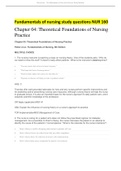Summary
Summary of Philosophy Unit 3 - The Problem of Evil and Suffering
- Institution
- PEARSON (PEARSON)
Summary of Philosophy Unit 3 - the problem of evil and suffering specification, including: 3.1 - Problem of Evil and Su(ering The nature of the problem across a range of religious traditions, types of evil and suffering, moral and non-moral, the challenge to religious belief posed by the incons...
[Show more]










